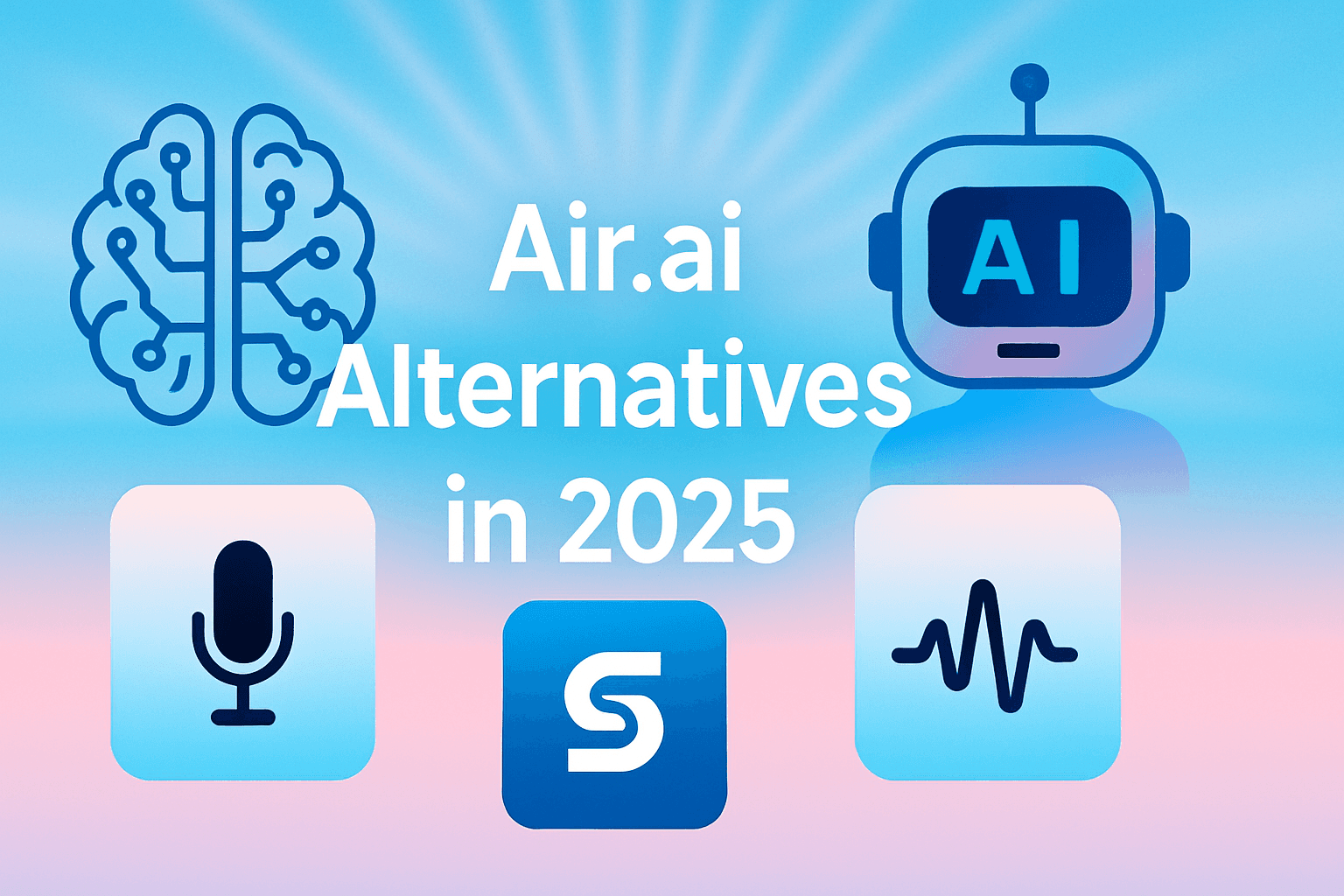Compare top AI voice agent platforms like Smallest.ai, Retell.ai, PolyAI, and more. Discover pricing, use cases, and real-time features for sales and support teams.

Akshat Mandloi
Updated on
January 27, 2026 at 5:08 PM
In the world of AI-powered voice agents, Air.ai has carved out a niche with its outbound calling automation and conversational AI features. However, as more companies look to scale customer engagement with real-time voice agents, many are exploring Air.ai alternatives that offer more flexibility, lower latency, better integrations, and pricing transparency.
If you're searching for a better fit in 2025—whether you're in sales, support, or product development—this guide will walk you through the top Air.ai alternatives, including Smallest.ai, Retell.ai, PolyAI, and more. Let's dive into what's changing in the AI voice space, and how to choose the right platform for your goals.
Why Look Beyond Air.ai in 2025?
Common Challenges with Air.ai
While Air.ai has been a powerful tool for sales automation, several growing pains are becoming apparent in 2025:
Limited customization of voice agents without engineering support
Opaque pricing models that don’t scale well for SMBs
Latency issues with real-time interactions in dynamic customer support settings
Weak integration options for developers needing flexible APIs
As AI voice technology becomes more real-time and personalized, businesses are demanding faster deployment, better multilingual support, and fine-grained control over tone, flow, and use cases.
What to Look for in an Air.ai Alternative
To evaluate alternatives effectively, consider:
Low-latency voice response (under 300ms)
No-code or developer-friendly workflows
CRM integrations like HubSpot, Salesforce, or Zendesk
Multilingual and emotion-rich voices
Affordable pricing models for different stages of growth
Top Alternatives to Air.ai in 2025
Let’s explore the best AI voice platforms that are challenging Air.ai this year, each with their own strengths and specializations.
1. Smallest.ai – Fastest and Most Flexible Air.ai Alternative in 2025
Smallest.ai is a modern AI voice agent platform designed for teams that need lightning-fast, hyper-realistic voice conversations. Unlike traditional AI dialers or template-driven bots, Smallest.ai delivers fully programmable voice agents that can adapt in real time—with ultra-low latency, voice cloning, and deep CRM integrations.
Key Features of Smallest.ai
1. Real-Time Voice Agents with <100ms Latency
Most AI phone agents struggle to maintain natural back-and-forth flow due to lag between user speech and system response. Smallest.ai eliminates this by offering:
Sub-100ms response time, even on high-concurrency calls
Seamless interrupt handling, barge-in support, and dynamic follow-ups
Live voice agent that feels like a human conversation—not scripted automation
2. Instant Voice Cloning (in Just 10 Seconds)
Smallest.ai allows you to upload just 10 seconds of speech to create a unique, emotionally rich voice clone:
Customize tone, pitch, and emotional range
Build brand-consistent voice personas for sales or support
Maintain audio identity across outbound calls, videos, or support channels
3. Multilingual and Mixed-Language Support
Smallest.ai supports 100+ voices in 45+ languages, with true code-switching (mixing languages mid-conversation):
Ideal for global customer bases, or hybrid regions like India, Singapore, UAE
Dynamic language detection based on user input
Regional dialects and culturally accurate pronunciation
4. Fully Programmable API + Python SDK
Designed for developers who want fine control:
Python SDK for fast prototyping
REST API to plug voice into any app, bot, or CRM
Real-time analytics and speech event triggers for custom call logic
5. CRM and Platform Integrations
Built-in integrations for HubSpot, Salesforce, Freshdesk, Twilio, and Zapier
Sync lead status, call logs, conversation metadata in real time
Trigger follow-ups, reminders, or workflows based on conversation outcome
6. A/B Testing and Analytics
Run A/B tests on call scripts, voice personas, call timings
Track conversion rate, user interruptions, and engagement drops
Voice transcripts, sentiment markers, and lead scoring via built-in tools
Use Cases of Smallest.ai in 2025
Outbound Sales: Qualify leads, follow-up on demos, and book meetings 24/7
Customer Support: Handle Tier-1 queries, password resets, and account info
Booking Automation: Take appointments over phone with confirmation via SMS or WhatsApp
IVR Replacement: Dynamic voice tree that adapts to natural input—not button presses
Voice Surveys: Conduct multilingual, engaging surveys without human intervention
Pricing Summary (Updated for 2025)
Plan | Price | Voice Time | Features |
|---|---|---|---|
Free | $0/month | 30 minutes | 1 voice, 20 API req/min, basic analytics |
Basic | $5/month | 3 hours | 1 instant voice clone, basic CRM sync |
Pro | $29/month | 24 hours | 2 instant clones, 1 professional voice, 50 API req/min |
Enterprise | Custom pricing | Unlimited | SLA, dedicated support, SSO, compliance features |
Why Smallest.ai Outperforms Air.ai
Feature | Smallest.ai | Air.ai |
|---|---|---|
Latency | <100ms | ~300ms+ |
Voice Cloning | 10 sec input | Not supported |
Multilingual | 45+ languages | Limited |
CRM Integration | Native + Zapier | Requires setup |
Real-Time API | Developer-first | Limited/no SDK |
Pricing | Transparent | Quote-based |
Try Smallest.ai – Launch a full voice agent in 5 minutes.
2. Retell.ai – Focused on Outbound Sales Calls
Retell.ai positions itself as a cold-calling and sales outreach engine, combining scripted flows with natural voice synthesis. While its features are more rigid than Smallest.ai, it works well for repeatable sales processes.
Features:
Prebuilt call templates for discovery, qualification, and appointment booking
CRM sync with Salesforce and HubSpot
Post-call transcripts and AI scoring
Best for: Sales teams running high-volume outreach and A/B testing of sales scripts.
Limitations: Less suited for inbound or multi-turn support conversations.
3. PolyAI – Enterprise Contact Center AI
PolyAI is trusted by large enterprises for its multilingual, high-volume contact center automation. It provides domain-trained models for specific verticals like telecom, hospitality, and banking.
Features:
Supports over 70 languages and dialects
Intent recognition + fallback handling
Used by brands like Marriott and Vodafone
Best for: Enterprises with global operations needing consistent, branded voice service across regions.
Drawbacks: Setup time is longer; pricing is quote-based.
4. Tidio AI – Affordable Chat + Voice for Small Businesses
Tidio AI brings together AI chat and voice support for eCommerce brands, Shopify stores, and SMBs. While not as advanced in voice tech as Smallest.ai or PolyAI, it’s cost-effective and easy to integrate.
Features:
Unified inbox for chat, email, and voice
Prebuilt AI chatbot templates
Voice assistant in beta for customer queries
Best for: Online stores and customer support teams needing omnichannel support without heavy coding.
5. Replicant.ai – Conversational AI at Enterprise Scale
Replicant focuses on enterprise-grade conversational intelligence across support and back-office automation.
🔹 Features:
Seamless integration with Zendesk, Salesforce, Genesys
Voice + text automation with human handoff
Used in industries like insurance, healthcare, and banking
Best for: Large support operations looking to reduce costs while improving resolution times.
6. Voiceflow – Design Tool for Custom Voice Agents
Voiceflow isn’t a voice agent platform itself—it’s a design-first tool for building custom AI agents using drag-and-drop flows. It integrates with LLMs, speech APIs (like Smallest.ai), and supports multi-turn dialog flows.
🔹 Features:
Visual agent builder for teams
Collaboration features for testing and prototyping
Deploys to Alexa, phone apps, websites
Best for: Teams designing bespoke voice experiences without deep coding knowledge.
How to Choose the Right Air.ai Alternative
1. Match Use Case to Capability
For real-time conversations, prioritize Smallest.ai or Replicant
For sales calls, Retell or Smallest.ai work well
For global support, look at PolyAI
For design flexibility, pair Voiceflow with an API-driven voice provider
2. Budget Considerations
Smallest.ai and Tidio offer transparent, flexible pricing
Retell and Replicant are more premium, enterprise-focused
PolyAI is quote-based, generally for larger orgs
3. No-Code vs Developer Flexibility
Use Smallest.ai or Voiceflow for instant prototyping
Choose Retell or Replicant if you prefer done-for-you flows
Developers will prefer Smallest.ai's API and SDK stack
Final Verdict: Best Air.ai Alternatives in 2025
Platform | Best For | Voice Latency | Pricing |
|---|---|---|---|
Smallest.ai | Real-time voice, inbound/outbound, dev teams | <100ms | Free–$29/mo |
Retell.ai | Sales outreach, cold calling | ~200ms | Mid-tier |
PolyAI | Enterprise support, multilingual | 200–300ms | Quote |
Tidio AI | SMBs and eCommerce | 300ms+ | Budget |
Replicant | High-volume contact centers | 200ms | Enterprise |
Voiceflow | Agent design and flow testing | N/A (builder only) | Mid-tier |
If you're building AI phone agents in 2025, your choice comes down to speed, customization, and scalability. For most companies—from lean startups to growing enterprises—Smallest.ai is the most balanced, affordable, and powerful Air.ai alternative right now.
Frequently Asked Questions
1. What are the best Air.ai alternatives in 2025?
Smallest.ai, Retell.ai, PolyAI, Tidio, Replicant, and Voiceflow are top contenders based on use cases and features.
2. Is Smallest.ai better than Air.ai?
If you need real-time response, instant voice cloning, and pricing transparency—yes, Smallest.ai offers superior flexibility and performance.
3. Can I use these platforms for sales outreach?
Yes. Retell.ai and Smallest.ai are both optimized for outbound calling and lead generation.
4. Do these tools integrate with Salesforce or HubSpot?
Most platforms—including Smallest.ai, Retell, and Replicant—offer CRM integrations.
5. What’s the cheapest AI voice platform?
Tidio and Smallest.ai offer the most affordable entry points, with free plans and low monthly tiers.
6. Are these AI platforms compliant and secure?
Yes. Most enterprise-grade options offer GDPR-compliance, voice data encryption, and secure authentication.
7. Can I create a voice that sounds like me?
With Smallest.ai’s 10-second voice cloning, you can generate a unique voice agent quickly.
Conclusion
The world of AI voice agents is moving fast. While Air.ai paved the way for automated voice calling, new platforms are making conversational AI more scalable, real-time, and accessible.
Whether you’re building a sales dialer, automating customer support, or integrating voice into your app, platforms like Smallest.ai, Retell, and PolyAI provide powerful options for 2025 and beyond.
👉 Ready to make the switch? Try Smallest.ai for free and launch your voice agent in just 5 minutes.


